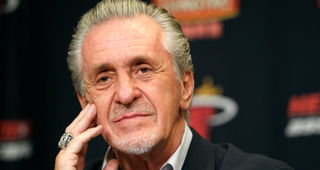There is an upcoming ESPN documentary series that, for many men my age, is Star Wars. In it, new footage from over twenty years ago will be shared, so that the basketball-loving world can once again revere Michael Jordan’s Chicago Bulls. The releases of brief trailers for the series have been bonafide Events for me and my sickly nostalgic ilk, the latest trickle coming on this past Christmas Eve. It features a gallery of the famous that includes Magic Johnson, Kobe Bryant, and Barack Obama—all here to recall Where They Were when Jordan’s team took their unforgettable last stand in 1998. In the midst of all of them, though, the booming soundtrack drops out for a moment for only one man, distinct in his gravitas even amidst this crowd: Pat Riley.
“Okay, everybody,” the still startlingly spry 74-year-old Miami Heat executive says in the trailer, settling into his chair for storytime in an all-white outfit that only the most brazen of men would dare consider. The music stops, and time does too, when we think of just how much a reflective Riley might have to say. Since becoming the head coach of the Los Angeles Lakers almost 40 years ago, he has taken exactly one year away from coaching or running—both at once, for more than a decade of his time in South Beach—an NBA team. His accomplishments in this time are extensive, and compiled in more encyclopedic places than this; here, we are more concerned with the unmistakable metaphysical contributions Riley has recently reasserted upon the league, by trading away one of his team’s prized young talents for a more immediately useful player, in the name of an impulse championship run. We’re reminded, once again—as if the most current moments of real life are also memorized re-runs—of Riley’s madman, war-historical sense of the game; of his exhausting insistence that his time is never up; of his evergreen willingness to throw all that he has into the fire for one more taste of the highest glory.
Riley has sent 23-year-old Justise Winslow to the Memphis Grizzlies for 36-year-old Andre Iguodala. There are other details to the trade—which actually includes a third team—all peripheral to the essence of what’s going on here. Feeling friskier about his team than he has in years, thanks to the downright libidinous effect that newcomer Jimmy Butler has had on this 34-17 Heat season, Riley saw an opening, and decided he’d rather go to battle with a man closer to his own sense of mortality and conquest than spend any more time waiting. Iguodala is old, and battered, but he’s spent all of this season in rest-and-recovery mode, and is after all a generationally versatile wingman, and one of the sharpest defenders the sport has ever seen. Perhaps most importantly, to Riley: he has been there. A three-time champion and one-time Finals MVP with the Golden State Warriors, Iguodala has many times bathed in the basketball blood that Riley lives to drink.
A beloved young player who could still theoretically blossom into anything—and a wonderful get for the Grizzlies—Winslow is the perfect sacrificial lamb to remind us of who Riley is. It’s tempting to say that, in flipping the future for the likely end of Iguodala’s days, Riley is doing this Just One More Time. But that kind of pronouncement has certainly been made about this man before. He might do this twelve more times. He might outlive us all, his thirst for championships a life-source stronger than science can explain. To be sure, this wellspring of competitive desire, probably too fulsome for this world, has often rankled important people around him, and led his teams away from providence. In 1989, he put his aging Lakers through a mind-boggling pre-Finals boot camp, which many cite as the reason they were swept by the Detroit Pistons. LeBron James left Miami on less than rosy terms with Riley. For years, even his relationship with Dwyane Wade was on the rocks.
But in Butler, Riley has found, at least for now, the perfectly imperfect surrogate for his forever-intensity. On his fourth team in as many years, Butler made himself a pariah with three previous franchises by having simply too powerful of an essence for his peers to bear. Butler now works for a man, in Riley, who relates to that dynamic all too much, and who in keeping with this passion-recognize-passion bond has propped Butler up as a culture-making zealot for all in the organization to replicate. Gone are Winslow, Hassan Whiteside, Dion Waiters, and anyone else with a conspicuous gap between potential and performance. Remade in Butler’s self-maximizing fashion, rich with diamond-in-the-rough upstarts and over-achievers, this team would be a fitting sendoff crew for Riley, if he were capable of quitting. They reflect his ethos as much as any collection of talent has. A forgettable professional player and a mostly ignored assistant coach, Riley ascended to the status of legend the moment he was given the wheel in Los Angeles, and enabled to let his furious willpower fly untied. It is bracing to be reminded again of this power, and thrilling to have the chance to watch another of his big-game hunting gambits play out—they are elemental to the NBA, and it remains impossible to imagine the league without them.



